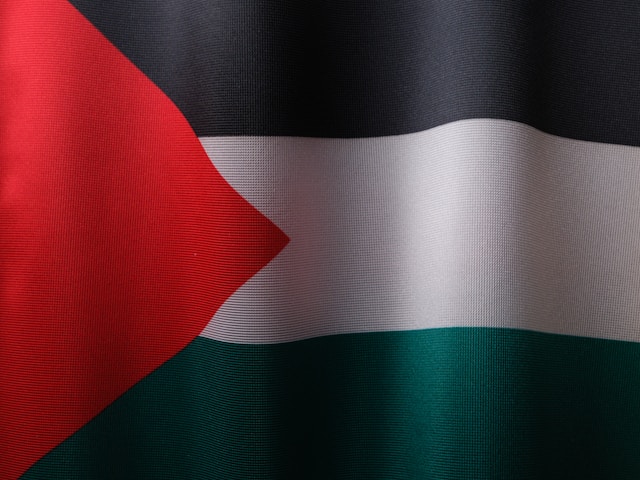Delegates at the Democratic National Convention demand a shift in the party platform to include an arms embargo against Israel, drawing attention with planned disruptions and protests in Chicago
In a dramatic turn of events at the Democratic National Convention in Chicago, pro-Palestinian delegates are mobilizing to push for a major policy shift. As the convention begins, these delegates are advocating for an arms embargo on Israel, a move that could create significant disruptions during high-profile speeches and events. The group, known as “Delegates Against Genocide,” aims to challenge the Democratic Party’s stance on U.S. military support for Israel, which they criticize in light of the ongoing conflict in Gaza.
The delegates are planning to make their voices heard by wearing Palestinian keffiyehs and carrying Palestinian flags during convention events. They hope to influence the party platform by proposing changes that would include a prohibition on military aid to entities that commit severe human rights violations. This demand comes amid widespread dissatisfaction among Muslim and Arab-American voters over U.S. support for Israel’s military actions in Gaza.
Embed from Getty ImagesOn the convention’s opening day, roughly 1,000 protesters demonstrated in downtown Chicago, chanting slogans such as “Shut down the DNC.” The protests reflect broader frustration with the Biden administration’s policies and are likely to intensify as the convention progresses. President Joe Biden and Vice President Kamala Harris are scheduled to speak, with Harris set to address the convention on Thursday.
The party’s draft platform, released in mid-July, calls for an immediate cease-fire and the release of hostages taken by Hamas, but it does not address U.S. arms sales to Israel or the high casualty figures reported by Palestinian health authorities. This omission has fueled demands from delegates for stronger language on human rights and military aid.
The Biden administration approved $20 billion in arms sales to Israel earlier this month, a decision that has exacerbated tensions with pro-Palestinian activists. The ongoing Israel-Hamas conflict, now in its 11th month, has eroded Democratic support among crucial voter demographics in battleground states. Activists argue that the party’s failure to address their concerns could impact voter turnout and support in the upcoming election.
Despite the limited number of pro-Palestinian delegates, their influence is evident in the planned disruptions and the high-profile nature of their demands. They have been pushing for a platform amendment that would address U.S. military aid policies and seek a more prominent role in shaping party policy. The Uncommitted National Movement, a separate group advocating for changes on Israel, has also been active, calling for a main-stage speaking slot for a Palestinian American or Gaza humanitarian worker.
While the Harris campaign has not commented on the specific demands for an arms embargo, Harris herself has expressed empathy for Gaza’s suffering, stating, “We cannot allow ourselves to become numb to the suffering and I will not be silent.” However, her national security adviser has indicated that she does not support an arms embargo on Israel.
The convention’s organizers are bracing for potential disruptions from the pro-Palestinian delegates and protesters. They have planned additional panel discussions on Arab and Palestinian issues, as well as on antisemitism, to address some of the concerns raised by activists. The outcome of these discussions and the degree of disruption during the convention could shape the party’s approach to the Israel-Palestine issue in the lead-up to the November election.
Analysis:
Political: The push for an arms embargo by pro-Palestinian delegates highlights a growing divide within the Democratic Party regarding U.S. policy on Israel. The delegates’ demands for a shift in the party platform reflect broader tensions between party leadership and activist groups. This internal conflict is particularly relevant as the party seeks to unify its base ahead of the November election. The party’s handling of this issue could influence its support among Muslim and Arab-American voters, who are crucial in key battleground states.
Social: The activism of pro-Palestinian delegates and the associated protests underscore the broader social impact of the Israel-Gaza conflict. The high-profile nature of these protests at the Democratic National Convention demonstrates how global conflicts can resonate within domestic political contexts. The push for an arms embargo and the planned disruptions reflect the activists’ frustration with the U.S. government’s role in the conflict and their desire for a more proactive stance on human rights.
Racial: The call for an arms embargo intersects with racial and ethnic dimensions, as the pro-Palestinian delegates and protesters include a significant number of Muslim and Arab-American individuals. Their activism highlights issues of racial and ethnic solidarity, particularly in the context of U.S. foreign policy. The dissatisfaction with the party’s current stance reflects broader concerns about racial and ethnic justice and the perceived marginalization of minority communities in political discourse.
Gender: Gender dynamics play a role in the activism surrounding the convention. Female delegates and activists, such as Nadia Ahmad and Layla Elabed, are prominently involved in advocating for policy changes. Their participation underscores the role of women in shaping political discourse and pushing for human rights issues. The visibility of female voices in the debate about U.S. military aid and the Israel-Palestine conflict highlights the intersection of gender and political activism.
Economic: The economic implications of the arms embargo demand relate to U.S. military spending and its impact on international relations. The approval of $20 billion in arms sales to Israel has economic ramifications for both the U.S. defence industry and the broader geopolitical landscape. The push for an embargo reflects concerns about the ethical use of U.S. military resources and the potential economic costs associated with supporting controversial policies. The activists’ demands may influence future U.S. defence policy and its economic consequences.
